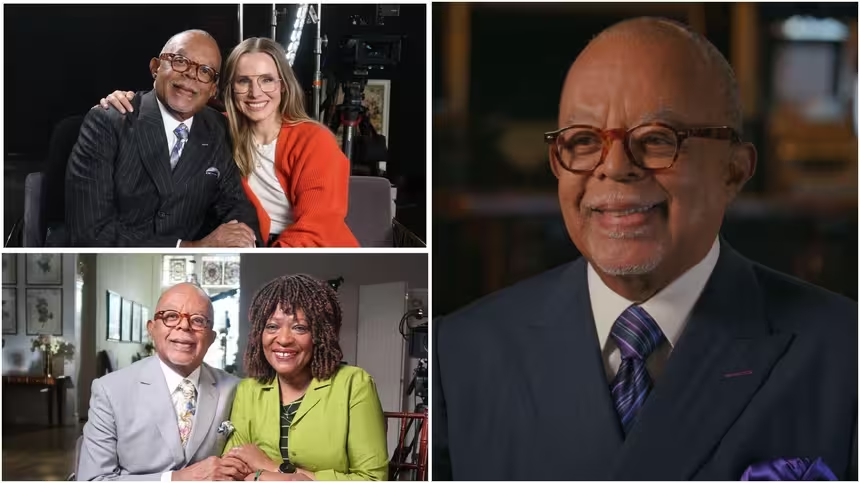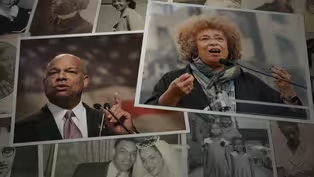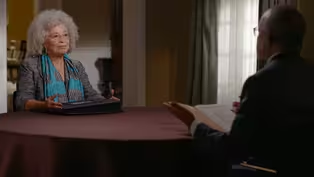Finding Your Roots
Jeh Johnson's Grandfather was a Renowned Sociologist at Fisk
Clip: Season 9 Episode 8 | 7m 14sVideo has Closed Captions
Jeh Johnson discusses the many accomplished ancestors on both sides of his family.
"If you know your legacy, you know your history, you will find many interesting things." -- Jeh Johnson remarking on the long line of accomplished ancestors on the maternal and paternal sides of his family.
Problems playing video? | Closed Captioning Feedback
Problems playing video? | Closed Captioning Feedback
Corporate support for Season 11 of FINDING YOUR ROOTS WITH HENRY LOUIS GATES, JR. is provided by Gilead Sciences, Inc., Ancestry® and Johnson & Johnson. Major support is provided by...
Finding Your Roots
Jeh Johnson's Grandfather was a Renowned Sociologist at Fisk
Clip: Season 9 Episode 8 | 7m 14sVideo has Closed Captions
"If you know your legacy, you know your history, you will find many interesting things." -- Jeh Johnson remarking on the long line of accomplished ancestors on the maternal and paternal sides of his family.
Problems playing video? | Closed Captioning Feedback
How to Watch Finding Your Roots
Finding Your Roots is available to stream on pbs.org and the free PBS App, available on iPhone, Apple TV, Android TV, Android smartphones, Amazon Fire TV, Amazon Fire Tablet, Roku, Samsung Smart TV, and Vizio.
Buy Now

Explore More Finding Your Roots
A new season of Finding Your Roots is premiering January 7th! Stream now past episodes and tune in to PBS on Tuesdays at 8/7 for all-new episodes as renowned scholar Dr. Henry Louis Gates, Jr. guides influential guests into their roots, uncovering deep secrets, hidden identities and lost ancestors.Providing Support for PBS.org
Learn Moreabout PBS online sponsorshipJeh's paternal grandfather, Charles S. Johnson, was a renowned sociologist and the first Black president of Fisk University.
And Jeh's maternal roots were notable as well.
- My mother's family were native Washingtonians.
They were proud to live in the nation's capital.
My mother used to tell the story of watching Franklin Roosevelt in his convertible with the dog, driving up Maryland Avenue, past her home, with a secret service chase car.
(laughs) - Imagine that!
- Imagine that.
And years later, I said to her, "Would you ever have imagined your own son would one day have a secret service chase car?"
(laughs) - The C and D student in high school?
(laughs) - Interestingly, her mother's family were Goodwins from Alabama, from Selma, Alabama.
If you went to the Brown A.M.E. Chapel in Selma, Alabama, the National Historic Landmark, where the marches originated from, you would see the name R. M. Goodwin, founding secretary, on the cornerstone.
That is my great-great-grandfather.
- Man, you come from people on both sides!
(laughs) - Well, we've done a lot of research.
As you say, every person's legacy is interesting.
- It is.
- If you know your legacy, you know your history, you will find many interesting things.
- Jeh's words would prove prophetic.
As we dug into his roots, we uncovered one of the most interesting stories we've ever told.
A story that, somehow, had been lost in the passage of time.
It begins in the 1870 census for Robertson Township, Virginia, where we found Jeh's great-great grandfather, Joseph Clore, listed as a nine-year-old boy, living in a household headed by his mother, a woman named Margaret Clore.
- [Jeh] Oh my.
- What's it like to see this?
This is your family over 150 years ago, just five years after the end of the Civil War.
- News to me!
(laughs) - This is fascinating, and I did not know that I had ancestors in Robertson Township, Virginia.
- Well, as you can see, Joseph and his mother and several of his siblings were all born before 1865, meaning that they were likely born into slavery.
- Yes.
- Have you thought much about your ancestors who were enslaved?
- Yes, I could visit the grave site of a number of ancestors who were enslaved.
- Mhm.
- And cannot fathom what life was like then.
But, I am mindful of it.
- It can be very difficult to trace African-American roots under slavery because enslaved people weren't typically listed by name in federal records.
But in Jeh's case, we got lucky.
In 1874, 9 years after emancipation, his third great-grandmother, Margaret, gave a deposition in which she described her family in great detail, introducing Jeh to a host of ancestors whose names and identities were a complete surprise.
- I am the widow of Lewis B. Clore.
He was a slave of Aaron Clore, who was his father.
He had 10 children by the same woman, who was a slave of his also.
Her name is Eliza Clore.
She lives near me now.
So, I guess I'm related to some white folks named Clore.
- Your fourth great-grandfather was a white man, and his name was Aaron Clore, and he owned your fourth great-grandmother, a woman named Eliza.
What do you make of that?
- I don't know what to make of that.
That is striking.
That's striking to me.
- Mm.
I don't think I've ever heard of such an arrangement.
- But it raises a lot of questions about him.
- 10 children by the same woman who was a slave.
- Yeah.
(sighs) - Can you love someone who owns you?
- I suppose in theory.
- Mm.
- I don't know.
We'll never know the relationship between these two.
- Mhm.
- Wow.
- We wanted to learn more about this highly unusual couple.
And in the 1860 census for Virginia, we found a slave schedule for Aaron Clore.
- As was customary, the schedule lists enslaved people, not by their names, but only by their age, gender, and color.
It wasn't definitive, but it did allow Jeh the chance to glimpse his fourth great-grandmother as the human property of his fourth great-grandfather.
- Number 1.
They have numbers.
(laughs) - Age 50, female, black.
Number 2, age 45, female, black.
Number 4, age 28, male, black.
They're not even worthy of a name in the census.
- No names.
- Right.
- So you know what that means.
Either the 45 year old or the 50 year old woman is your fourth great-grandmother, Eliza.
And the 28 year old man is their son, your third great-grandfather, Lewis.
- They're listed like commodities.
- He was listing the woman who bore his children and his own son!
- He's listing his family, but they're not worth a name.
- Right.
- Right.
Yeah.
- What's it like for you to know, A, the name of the white man who owned your family, and B, to know the name of the white man who is your fourth great-grandfather?
- The best way to look at this, in my judgment, is it's the American story, in all of its tragedy and hypocrisy.
- Mhm.
- And I can't undo it.
I won't disavow it.
It's part of who I am.
It's part of who I am as an American and an American of African descent.
- Mhm.
- Would I want my grandchildren to see this page?
Absolutely, because I'd want them to understand our history and this nation's history, in its full color.
So, it is what it is.
We have to accept the reality of it.
And, just like I can't lop off my left arm, I can't lop off Aaron Clore, slave owner, who happens to also be my direct ancestor.
Video has Closed Captions
Preview: S9 Ep8 | 32s | Henry Louis Gates reveals the unexpected family trees of Angela Y. Davis and Jeh Johnson (32s)
Angela Davis' Great-Grandfather Took a Slaveowner to Court
Video has Closed Captions
Clip: S9 Ep8 | 5m 42s | Angela Davis' great-grandfather marks her family's transition from slavery to freedom. (5m 42s)
Providing Support for PBS.org
Learn Moreabout PBS online sponsorship

- History
Great Migrations: A People on The Move
Great Migrations explores how a series of Black migrations have shaped America.












Support for PBS provided by:









